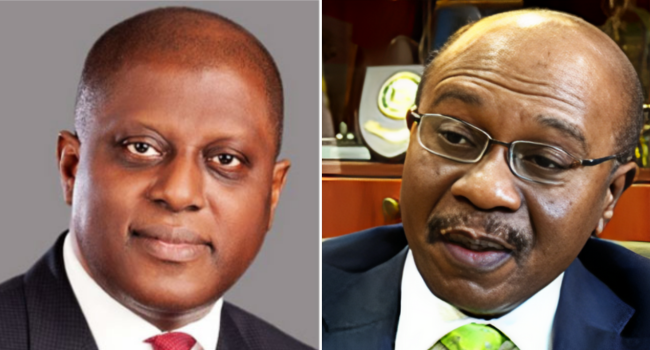
The Central Bank of Nigeria (CBN), is the apex monetary authority in Nigeria. It is responsible for maintaining monetary stability, promoting economic development and ensuring financial system stability.
The key functions of the CBN include formulating monetary policy to control inflation, interest rates and exchange rates; issuing and managing the supply of currency; providing banking services to the federal government; supervising and regulating commercial banks and maintaining stability in the financial system.
These functions, among other things, are aimed at maintaining price stability to ensure low and stable inflation, promoting stable exchange rate; ensuring stability.
To this end, the CBN promotes access to financial services, encourages digital payment by reducing cash dependency, and supporting small and medium sized enterprises.
The CBN plays a significant role in Nigeria’s economic development and its policies have a crucial impact on the country’s financial system and economy. What the CBN does at any given time, as initiated by the CBN governor, is critical in realizing the objectives of the bank or otherwise.
The quality of the CBN governor matters in realizing the objectives of the apex bank. In what follows, we shall look at what the CBN accomplished under the immediate past Governor Godwin Emefiele and the incumbent, Olayemi Cardoso, by way of comparing their achievements to know who has impacted more on the economy.
To start with, the leadership of Godwin Emefiele at the CBN was marked by several key initiatives with many challenges. Among the developments were:
First, initiating intervention funds. Emefiele introduced more than 37 intervention funds to stimulate the economy and enhance growth, which addressed un-employment. Example was the Anchore Borrowers Programme, which granted N756.51 billion to 3,734,938 small holder farmers. This boosted agricultural productivity at local levels.
Second, financial inclusion: The CBN under Emefiele aimed at increasing financial inclusion with initiatives like the Loan to Deposit Ratio (LDR) policy, which led to a 97.79 percent year – on – year increase in bank’s credit to the private sector.
Third, foreign exchange policy: The Emeifele led CBN implemented policies to preserve the value of the naira and maintained the favourable external reserves position.
Fourth, currency re-design: Governor Emeifele oversaw the re-design of the Nigerian naira, which aimed to reduce counterfeiting and increase financial inclusion. However, the policy faced severe criticism, with some people arguing that it cost hardship and cash shortages.
Sixth, economic growth: Emeifele’s policy aimed to promote economic growth, including initiatives to boost non-oil-sector output and increase private sector credit extension.
Seventh, Emeifele’s leadership was not without controversy with some critics arguing that his policies exacerbated economic challenges. Some highly placed Nigerians, example, Femi Falana (SAN), even called for Emeifele’s prosecution, alleging that the CBN under him caused hardship and mopped up over N3 trillion but raised only N402 billion to banks. Nevertheless, Emeifele made some notable achievements which include:
Covid-19 Response. Emeifele played a role in the Coalition Against Covid–19 (CACOVID), which raised over N19.4 billion for paramedic relief.
Development Financing: The CBN under Emeifele’s watch acted as a financial catalyst in specific sectors of the economy, particularly, agriculture, create jobs, improve local food production and conserve scarce foreign reserve.
Economic Stabilization: Emeifele implemented bold measures to stabilize the financial system, including raising interest rate and restricting foreign exchange access, which helps to navigate Nigeria through turbulent economic waters.
Agricultural Sector Support: The CBN’s N50 billion textile sector intervention facility increased capacity utilization of ginneries from 30 percent to nearly 90 percent, which included the Anchore Borrowers’ Programme that granted N756.51 billion to 3,734,888 small holder farmers.
Leadership and Vision: Emefiele’s leadership and vision were instrumental in stabilizing the economy and promoting development.
With regard to Olayemi Cardoso, the incumbent Governor of the Central Bank of Nigeria (CBN), he has been steering the country’s monetary and financial policies since September 2023. Some key developments under his watch include:
First: CBN reset: Cardoso proposed a reset for the CBN aiming to restore the bank’s creditability and effectiveness in achieving price stability, exchange rate stability, and financial stability
Second, Transparency and Policy Consistency: Cardoso prioritizes transparency and policy consistency to rebuild trust in the CBN and promote investor confidence.
Third, Culture of Compliance: Cardoso emphasizes the importance of aligning with provisions in the CBN Act and embracing culture of compliance.
Fourth, Investor Confidence: Cardoso’s policies aim at restoring investor confidence in the Nigerian market, promoting economic growth and development.
Fifth, FX Market Reform: The CBN under Cardoso has implemented reforms to improve the foreign exchange market, thereby increasing transparency and investor confidence. Furthermore, under the CBN’s reforms and agenda, the following developments are taking place under Cardoso
An 18-Month Reform Agenda: The CBN under Cardoso has outlined an 18-Month Reform Agenda, focusing on monetary tightening, FX market transparency, and stronger financial governance.
Monetary Policy: Cardoso has emphasized the importance of orthodox monetary policy, prioritizing price stability and economic growth.
No Turning Back: Cardoso has assured that the CBN will continue on its part of reform prioritizing transparency, policy consistency and investor confidence.
Without doubt, Emefiele’s tenure as the CBN Governor had both positive and negative impacts in the economy. On the positive side, Emefiele’s policies significantly led to a decrease in import bills for rice and wheat up to 98% and 95% respectively, due to increase in local production. That was real term agricultural development.
Also, the real sector recorded growth. The CBN reportedly dedicated a whooping N1 trillion to the real sector facility loans. It galvanized some 255 real sector projects which included mining and service industries and-processing.
There was economic stimulus. The support for airlines through long term loans and the National Mass Metering Programme were positive strides to stimulate economic growth.
Furthermore, Emefiele enhanced infrastructural development initiatives, such as Differentiated Cash Reserve Requirement . He also supported projects like the Lagos State Redline and Blueline rail project.
On the negative side, under Emefiele there was decline in GDP from $546.68 billion in 2014 to $440.78 billion in 2021 representing a 23.03% decline.
There was inflation. Money supply increased from N1.46 trillion in 2015 to N3.27 trillion in 2022. There seemed to be loss of control over money supply as there was substantial amount of money of about 84.52% outside the banking system, which made it challenging for the Monetary Policy Committee to control inflation.
There was also over-hyped Forex Market. The FX policy was critised as being sustainable and contributing to economy instability.
The incumbent Olayeme Cartoso’s tenure has also recorded positive and negative impacts on the economy. There is on-going economic reforms in an effort to strengthen long term economic growth including diverting monetary tightening, FX market transparency and fortified financial governance.
The CBN seems to be laying the foundation for long term economic growth with emphasis on the need to restore micro economic confidence and build economic resilience.
But on the negative side there is naira devaluation, which has plunged from about 460 to $1 to over 1,600 to a dollar. This has significantly impacted everyday purchasing power of Nigerians with increased inflation and rising cost of living.
There is high interest. The aggressive monetary tightening including, steep interest rate hike of up 26.5%, has discouraged borrowing and investment, thereby, affecting the most vulnerable populations .
It is argued in many quarters that Cargoso’s policies have contributed to the economic decline, prioritizing international mandate over local needs.
It is clear from the fore-going that the CBN under Emeifele and Cardoso has endeavoured to initiate some policies aimed at strengthening monetary policy and the economy. However, the development under Emefiele are more far reaching and cannot be compared with what Cardoso is trying to do.
Emefiele, it should be pointed out, presided over the CBN for about 8 years while Cardoso is barely less than two years. It is hoped that with time, Cardoso will be able to initiate more effective policies and programmes that would help the economy.
Truth is that no matter what both Emefiele and Cardoso have done so far, the Nigerian economy is still weak and needs drastic overhaule for it to stand firmly.
Dr. Onyekakeyah, former member of The Guardian Editorial Board is a Public Affairs Commentator and a Daily Query columnist.
Follow us on all social media platforms @dailyquery for news and analyses around the globe.



























